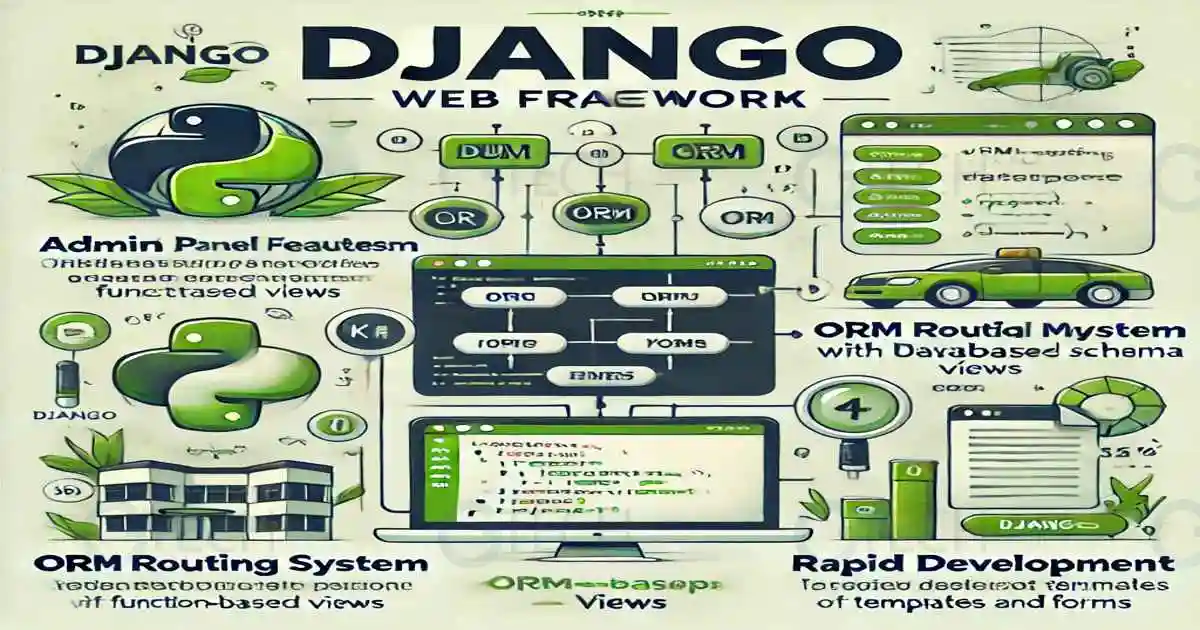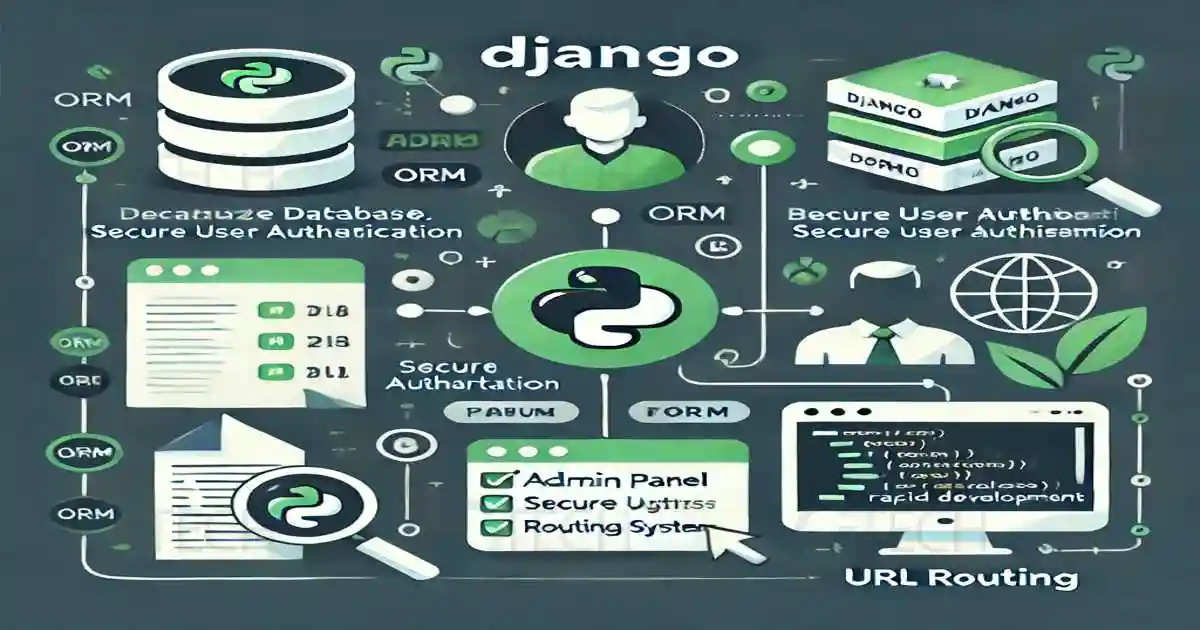Key Features of the Django Framework
Django is a high-level Python web framework that has gained immense popularity among developers for its efficiency, simplicity, and versatility. Designed to help developers build robust and scalable web applications quickly, Django provides a comprehensive set of tools and features that streamline the web development process. Whether you’re a beginner exploring web frameworks or a seasoned developer, Django’s features make it a top choice for a wide range of projects.
What is the Django Framework?
Django is an open-source web framework written in Python. Its primary goal is to enable rapid development and clean, pragmatic design. The framework follows the Model-View-Controller (MVC) architectural pattern, referred to as Model-View-Template (MVT) in Django’s terminology. With Django, developers can focus on writing their applications without worrying about repetitive tasks such as user authentication, URL routing, and database management.
Key Features of Django
Django comes with numerous built-in features that simplify the web development process. Let’s explore the key features that make the Django framework stand out:
1. Rapid Development
One of Django’s most celebrated features is its ability to facilitate rapid development. With built-in tools like the Django admin interface and a development server, developers can quickly prototype and build functional applications. The “don’t repeat yourself” (DRY) philosophy helps minimise redundant code, saving time and effort during the development process.
2. Built-in Admin Panel
Django’s admin panel is a powerful tool for managing web applications. Automatically generated based on the models defined in the Django project, the admin interface allows developers to manage data, perform CRUD (Create, Read, Update, Delete) operations, and handle user authentication with ease. The admin panel simplifies the backend management of Django applications, making it highly efficient for developers and administrators alike.
3. Object-Relational Mapping (ORM)
Django’s ORM provides a seamless interface for interacting with databases. Instead of writing raw SQL queries, developers can define models in Python code, which Django automatically translates into database tables. This approach supports a wide range of databases, including PostgreSQL, MySQL, SQLite, and Oracle. The ORM also simplifies database migrations, making it easier to manage changes in the database schema.
4. Security Features
Security is a top priority for Django. The framework includes built-in protection against common security threats such as cross-site scripting (XSS), cross-site request forgery (CSRF), SQL injection, and clickjacking. Django also handles user authentication and session management securely, ensuring that sensitive data is well-protected.
5. Scalability and Performance
Django is designed to handle high-traffic and large-scale applications. Its modular architecture allows developers to build scalable web applications with ease. Features like caching, middleware, and efficient database querying contribute to Django’s impressive performance. Django’s compatibility with popular cloud platforms and containerisation tools like Kubernetes ensures that applications can scale seamlessly.

6. URL Routing
Django’s URL routing system simplifies the mapping of URLs to views. Developers can define URL patterns using regular expressions or path converters, making it easy to create clean and user-friendly URLs. This feature enhances the structure and navigation of web applications, improving the overall user experience.
7. Template Engine
Django’s template engine allows developers to define the presentation layer of their applications. With features like template inheritance, filters, and context variables, the template engine simplifies the process of creating dynamic and reusable HTML files. This separation of concerns ensures a clean structure for Django projects.
8. Django Forms
Forms are an integral part of web applications, and Django simplifies their creation and management with its forms framework. Django forms support validation, CSRF protection, and automatic HTML rendering, enabling developers to handle user input efficiently and securely. Whether you’re creating a simple contact form or a complex multi-step form, Django forms streamline the process.
9. Static and Media Files Management
Managing static and media files is effortless with Django. The framework provides tools for serving static files like CSS, JavaScript, and images during development. It also supports the use of third-party storage solutions for handling media files in production environments. With Django, developers can ensure that static and media files are organised and accessible.
10. Wide Community Support and Extensive Documentation
Django boasts a vibrant community and extensive documentation, making it an excellent choice for beginners and experienced developers alike. The community’s active contributions, forums, and events like DjangoCon ensure that developers have access to a wealth of resources. Whether you need guidance on a specific feature or want to explore advanced topics, Django’s documentation and community are invaluable.
11. Versatility Across Domains
Django’s versatility makes it suitable for a wide range of applications, including web development, data analysis, machine learning, and artificial intelligence. Its compatibility with Python libraries like NumPy, Pandas, and Scikit-learn allows developers to integrate advanced data science and machine learning capabilities into their Django projects seamlessly.
12. Third-party libraries and Django Packages
Django supports a wide range of third-party libraries and packages that extend its functionality. Whether you need tools for e-commerce, API development, or analytics, Django packages simplify integration and accelerate development. Popular packages like Django REST Framework (DRF) make it easy to build RESTful APIs, while libraries like Scrapy support web scraping tasks.
13. Middleware Support
Middleware in Django allows developers to process requests and responses globally. This feature is useful for tasks like authentication, logging, and performance optimisation. With middleware, developers can add custom functionalities to their applications without modifying the core codebase.

14. Support for Multiple Languages and Localisation
Django’s built-in support for internationalisation and localisation enables developers to create applications that cater to a global audience. With tools for translating content, formatting dates, and handling currencies, Django simplifies the process of building multilingual applications.
15. Customisable and Extensible
Django’s modular architecture makes it highly customisable and extensible. Developers can override default settings, add custom features, and extend the framework’s functionality to meet the unique requirements of their projects. This flexibility ensures that Django can adapt to various use cases and industries.
Django vs. Other Web Frameworks
While there are many web frameworks available, Django stands out for its comprehensive feature set, security, and scalability. Compared to Flask, another popular Python web framework, Django offers more built-in features, making it ideal for larger projects and rapid development. On the other hand, Flask’s minimalistic approach provides greater flexibility for developers who prefer a lightweight framework. Django’s ORM, admin interface, and extensive documentation give it an edge over other frameworks, especially for beginners.
Conclusion
Django is a powerful and versatile web framework that empowers developers to build high-quality web applications efficiently. Its robust features, security, and scalability make it a top choice for projects of all sizes. Whether you’re working on a small personal project or a large-scale enterprise application, Django provides the tools and resources needed to succeed.
At G-Tech Solutions, we specialise in web application development, leveraging the power of frameworks like Django to deliver tailored solutions for our clients. Our expert team ensures that every project meets the highest standards of quality and performance. Ready to transform your ideas into reality? Contact G-Tech Solutions today and let us build a cutting-edge web application for you!



